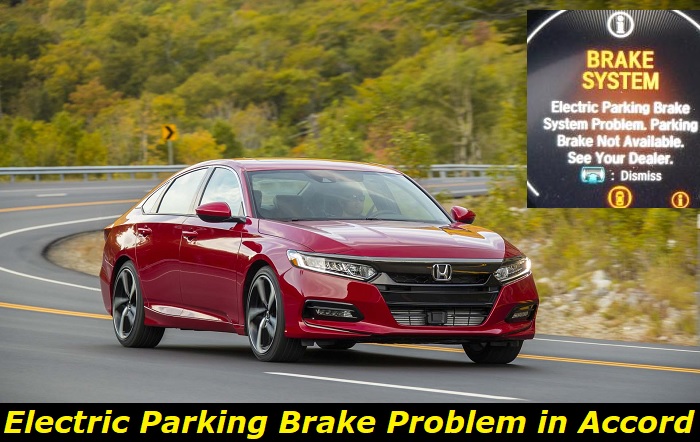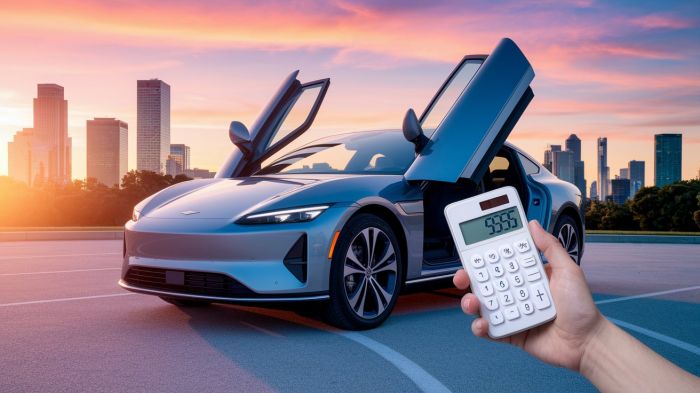The Honda Accord is marketed by its maker as where sophistication meets efficiency. It features state-of-the-art solutions not only for improving its mobility but also to offer an extra level of comfort and safety to its driver and passengers.
Electric parking brake problem message highlights
- Common reasons:parking brake motor, EPB control module issue, 12V battery weak
- How to fix:check the battery, read the codes, try disconnecting the battery for some time
- Possible consequences:parking brake may not be engaged
- Priority level:High
- Can you drive?Yes
- DIY repair:Possible but complicated
- Repair price range:$50-$500

About the Electric Parking Brake in Honda Accord
Basically, the EPB is a braking system utilized by Honda that uses an electric motor to apply and release the brakes. This system is designed to make it easier for the driver to park the vehicle as well as to provide extra safety while the vehicle is parked. The EPB system can be activated by simply pressing a button, and will automatically release when the vehicle is put into gear.
The electric parking brake system of Honda has a lot of advantages that make it a great choice not just for the Accord but for any vehicle. If you're looking for a braking system that is easy to use and offers a variety of benefits, then the EPB system will surely come in pretty handy.
Most Common Problems in the EPB of the Honda Accord
The EPB is definitely one of the most useful technologies found in the Accord. However, it can be quite a hassle if it malfunctions because it can pose plenty of safety hazards.
One of the worst things that could happen when the system fails to engage is that it may cause your vehicle to run off from its parking spot, which may result in injury or damage to property. On the other hand, you are also risking an injury to yourself and your passengers if it suddenly engages while you are driving. Therefore, any problem found in the system should be addressed immediately to avoid such scenarios.
Here are the most common problems in the electronic parking brake system of the Accord that you should watch out for as well as the possible solutions for each of them:
1. Malfunctioning Parking Brake Switch
Most complaints about the EPB of the Accord have something to do with the parking brake switch failing to engage. This may simply be due to dirt preventing its operation or a problem with the switch itself.
Dirt or other foreign particles might have accumulated on the switch, preventing it from functioning well. In this case, it can be cleaned with a soft cloth or a brush. This is something that you can easily do if the contamination is limited to the exterior of the switch. If the debris has already reached the internal components of the switch though, you may need the help of a technician to clear its mechanism of any foreign objects.
If the above solution fails, then the electric parking brake switch may be faulty. In this instance, you can use a multimeter to diagnose whether or not it's still working or if there's enough power going into the device.
First, set the multimeter to the ohms setting. Then, disconnect the switch from the circuit. After that, test the switch for continuity. If there is no continuity, then the switch is most likely defective and needs to be replaced by a qualified technician.
2. Dirty or Corroded Wiring
One way to tell if your electric parking brake is not functioning properly is by looking for dirty or corroded wiring. If the lines and connectors of the harness are just dirty, cleaning them with a soft cloth may do the job. Worn or corroded wires will require immediate replacement though.
Another way to diagnose faulty wiring in the electric parking brake is by using a multimeter. By testing the continuity of the wires, you can determine if there is an issue with the system.
To check for continuity, you will need to test the wiring with a multimeter. Set the multimeter to " continuity " and touch the probes to each wire. If there is a break in the wire, the multimeter will show no continuity.
If you suspect that your electric parking brake is not working correctly due to faulty wiring, it is important to have it checked and fixed by a certified technician as soon as possible. In any way, damaged wiring should be replaced immediately to prevent electrical issues that may result in an accident or fire.
3. Blown Fuse
If your electric parking brake isn't working, the other thing that you should check is the fuse. A blown fuse can prevent the parking brake from functioning properly.
To diagnose a blown fuse, you'll need to use a multimeter. First, locate the fuse box and find the fuse for the electric parking brake. Then, remove the fuse and test it for continuity. If the fuse is blown, it will show no continuity.
Using a multimeter to check the proper flow of electricity in the wiring, set it to the continuity setting. Touch one probe to each end of the fuse. If the meter beeps or lights up, the fuse is good. If there is no continuity, the fuse is blown.
Once you've diagnosed a blown fuse, replacing it is easy. Just head to your local auto parts store and pick up a new fuse of the same amperage. Then, simply insert the new fuse into the fuse box and you should be good to go!
If you suspect that other factors may have caused the fuse to short, it's best to bring your auto to an experienced technician for further diagnosis and repairs.
4. Draining or Drained Battery
If you're having trouble with your Accord's electric parking brake, it could be a sign that your battery is draining. Some other symptoms of a draining or drained battery that you should keep a lookout for are when the car's engine is slow to start or doesn't start at all, the headlights are dimming or flickering, the starter motor turns slowly, and there's a clicking noise when you turn the key in the ignition.
The best way to diagnose a faulty battery is through a multimeter. First, make sure the car is turned off and the keys are out of the ignition. Then, open the hood and locate the battery. Place the red lead of the multimeter on the positive terminal of the battery, and the black lead on the negative terminal.
If the multimeter reads 12.6 volts or higher, the battery is fully charged. If it reads 12.4 volts or lower, the battery is discharged and needs to be replaced.
5. Parking Brake Mechanism Not Releasing
Last but not least is a problem with the electric parking brake mechanism not releasing. This issue may be due to various issues within the electrical and braking systems. The solutions for these can range from simple to complicated repairs.
Start your diagnosis by ensuring that the switch, wiring, and fuse are all working well using the solutions mentioned earlier. If they are all in good condition, proceed with the components directly related to your braking system.
Then, check the level of brake fluid in the Accord's reservoir. If it is low, add more fluid. If it is contaminated, flush the system and add a fresh batch of fluid. Insufficient or poor-quality brake fluid circulating in the system of your car can result in lubrication issues that may impede the proper operation of its mechanical parts, so this is something that you should also check before anything else.
Next, assess if the brake pads and calipers are sticking. Inspect them thoroughly for wear and tear. If they are worn out, they will need to be replaced. However, if it's just grime causing them to behave that way, you can remedy the situation by carefully removing the accumulated dirt.
In addition, inspect the brake hoses and master cylinder for leaks. If you find cracks or any traces of fluid leak there, the said components will need to be replaced. Other symptoms of issues with the master cylinder include unresponsive and spongy brakes.
After that, see if the parking brake cables have been damaged. Examine them for signs of fraying or other damage. If they are damaged, they will need to be replaced.
Finally, this problem can be linked to an issue with the ABS. The key indicator for this would be the ABS light turning on. If you suspect that this is the source of the issue, have the system checked by a qualified technician.
Conclusion
The electric parking brake problem in the Honda Accord can be triggered by a lot of factors. Therefore, it is important to diagnose the problem correctly before taking any action as some of the possible solutions might not work if the actual cause is something else. Replacing a part when it is not necessary can be expensive and time-consuming, so it is always best to troubleshoot the issue thoroughly and with the help of a professional before taking any further steps.
About the authors
The CarAraC research team is composed of seasoned auto mechanics and automotive industry professionals, including individuals with advanced degrees and certifications in their field. Our team members boast prestigious credentials, reflecting their extensive knowledge and skills. These qualifications include: IMI: Institute of the Motor Industry, ASE-Certified Master Automobile Technicians; Coventry University, Graduate of MA in Automotive Journalism; Politecnico di Torino, Italy, MS Automotive Engineering; Ss. Cyril and Methodius University in Skopje, Mechanical University in Skopje; TOC Automotive College; DHA Suffa University, Department of Mechanical Engineering






Add comment